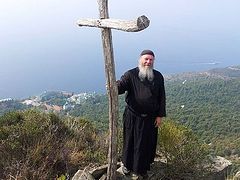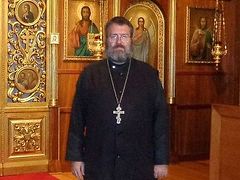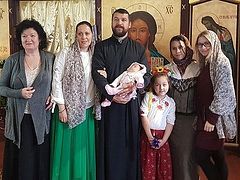This story began many years ago, when Dmitry Volodikov, unemployed and exhausted, dropped in at a church in Moscow to ask for some water…
“Please give me a drink—I am so hungry…”
Our forebears used to say: “Our Lord is the old Wonder Worker.” He can draw us to Himself in very unpredictable ways and I know this by experience. Now I am the churchwarden of St. Nicholas Church in the village of Kamenka in the Kaluga region, not far from Optina Monastery and Shamordino Convent. I’m a student of the Kaluga Theological Seminary and at present wear a cassock.
I couldn’t have imagined any of that twenty-five years ago, when one hot summer day I was walking around Moscow, weary, depressed, and jobless. In the “crazy nineties” I came to Moscow in search of a good permanent job which would allow me to provide for my family. Having put up at the cheapest hotel, I kept searching, knocking on every door, but I seemed to be out of luck. That is, though I did have a job, I earned just enough to provide for myself and not for my family.
I was about to go back home in despair. I spent my last money on a ticket for the next morning and was walking back to my hotel to spend the final night there. It was the end of Great Lent. Though I understood nothing about it, it can be said that I “kept a strict fast”: I would save on food and my diet mainly consisted of instant noodles. The weather was broiling, I was parched with thirst, but it was a long way to my hotel and I grudged spending my last penny on a bottle of water.
I saw a church on my way and decided to pop into it and ask for a drink. Here I can’t help but recall the beggar from a famous Russian joke: “Please, give me a drink—I’m so hungry, that I have nowhere to spend the night.” I thought: “Religious people won’t refuse to give me a glass of plain water!”
When I went inside the church, I asked an old lady to give me some water to drink. When I started quickly gulping down the water, she muttered:
“You should have made the sign of the cross! You’re drinking holy water.”
Meanwhile, I had no idea that I was drinking holy water: I thought she had given me some tap water. I apologized and made the sign of the cross. That’s all. That was the starting point!
Now I am very lenient towards so-called “walk-ins”—individuals who just drop in at church to take a pussy-willow branch, to light a candle before their exams or out of curiosity. Though some believers criticize them severely, I know from experience that since the Lord has brought them to church, He knows what will come of it.
Let’s return to my story. When I returned to my hotel, I heard that there would be the midnight Paschal service that night. For some reason I didn’t feel like lying down and sleeping that evening, and, though I wasn’t a church-goer (the faith was just “in my soul”), I decided to go to the midnight service. Even the day before I couldn’t have imagined that I would go to church on the evening of the next day. That was the effect of the holy water—I just longed to go to church!
Not only did I attend the service: I even confessed and took Communion for the first time in my life. And I began to integrate into church life from that day.
“Dima, God exists!”
This is another example of how God draws us to Himself by the ways known to Him alone. My mom was born and grew up in the USSR and was non-religious; though, like me, she seemed to believe in God “deep in her heart.” She didn’t go to church.
At a mature age she decided to sell her house in Krymsk [a town in the Krasnodar territory in the south of Russia in the North Caucasus region.—Trans.] and move closer to the sea, spending the rest of her life by the sea. However, she couldn’t sell her house for three years.
“Dima [a diminutive form of the name Dmitry.—Trans.], sonny, what should I do to find a buyer?”
“Mama, try to pray. Come to church and pray there. And ask a priest to bless you to sell the house.”
“Can it really help?!”
“Just try!”
Some days later my mom called me and said excitedly:
“Dima, I’ve made up my mind to go to church. I stood through the service, prayed and after the service I asked the priest to bless me to sell the house. What should I do next?”
“Mama, just wait: now you will surely sell it.”
Three hours passed. I got another call from my mother. There was shock, almost fear, in her voice:
“Dima, my buyers are here! They’re offering a deposit. Shall I accept it?”
“Sure! Do it!”
And she sold her house right off—within three hours, though she had been unable to do it for three years before then. She eventually bought a house by the sea, as she wanted. And a year later there was a catastrophic flood in Krymsk, and the property values in the town dropped dramatically, so my mother wouldn’t have found any buyers if she hadn’t moved away earlier.
My mother told me many times after that event:
“Dima, God exists!”
“Yes, mama, I know!”
Speedy helpers
The Lord and His saints often answer our prayers very promptly, especially when we are neophytes and spiritual infants. And I know from experience that St. Nicholas is truly our speedy helper.
Once my wife and I were travelling to the south. There were worn-down roads near Rostov-on-the-Don, with many vans and trucks in front of us. They were driving slowly, with clouds of dust flying around; it was hard to move after them, and no way could we overtake them because of the oncoming traffic.
Then I prayed aloud:
“Holy Hierarch Nicholas, help us overtake these trucks!”
In an instant all the oncoming vehicles disappeared, and we managed to overtake the vans. No sooner had we done that than there was the oncoming flow of traffic, again.
We built a wooden church in honor of St. Nicholas of Wonderworker in our village Kamenka, but I’ll tell about this below.
Our miracles
Miracles abound. Formerly, my wife and I lived in Taman Stanitsa [a rural locality in the west of the Taman Peninsula in the Krasnodar territory.—Trans.], where we were parishioners of the Church of the Protecting Veil of the Mother of God, and our father-confessor was Archpriest Victor Kalmyk. My spouse Natalia was blessed to go to Moscow and enroll in courses on organization of pilgrimages. She completed them successfully and began to take pilgrims to holy sites as a guide.
Natalia is a responsible person, but the work was new to her. She was worried about that and naturally needed consolation and support. She prayed hard, asking God to bless her undertaking and give her comfort—and help came in a very miraculous way.
This is how it came to pass. One of our first pilgrimages was to St. Michael-Mount Athos Trans-Kuban Hermitage Monastery—an ancient stone monastery in the mountains of the Adygei Republic [an autonomous republic in the northwest Caucasus with a predominantly Muslim population.—Trans.].
There are very early caves there, which have survived since the Byzantine era. The faithful used to hide there during persecutions. On our arrival we proceeded to those underground grottoes. We were given candles, then lit them and walked with them for a long time. Of course, a little while later all that remained in our hands were candle stubs. I came up to Natalia with my candle stub and saw that her candle was whole and still burning.
“Have you taken a new one?”
“No, it’s the old one. I lit it at the very beginning together with everybody, and it’s still burning.”
I touched the flame of her candle and found that it didn’t burn or scorch. All the pilgrims gathered around us, wishing to touch it—it didn’t burn! It was a miracle. And not a meaningless miracle—it seemed it had been wrought especially for Natalia—to strengthen her faith and serve as a sign that her work (organization of pilgrimages) was pleasing to God.
We stopped on the way and visited the wooden Church of Greatmartyr Panteleimon. The local priest took out the casket containing a particle of his relics. All of us venerated it in turn. As Natalia told me later, she smelled a very strong fragrance in front of the relics, while no one else had smelled it. It must have been another sign from the Lord.
The coach was packed with pilgrims, and temptations are frequent during such tours. Therefore, Natalia was worried; but the Lord strengthened her.
On how we ended up at Optina
We had visited many holy places—Optina Monastery, the Holy Trinity-St. Sergius Lavra, Diveyevo Convent, etc. At that time we lived in Taman, in an apartment on the first floor of a house, without a yard, and in summer it was hot and stifling indoors. We wanted a house of our own so that any moment we could go out into the garden to have a picnic on the grass, just sit or read a book in the open. By that time our children had grown up and flown out of the nest.
We consulted the Lavra’s spiritual elders about our supposed move so that the Lord might reveal His will through them. We were blessed to move somewhere “closer to salvation and to nature.”
Just before our move there had been a terrible heat wave in Taman. With temperatures reaching fifty degrees Celsius in the sun, apples got “grilled”, so we could eat “baked” apples right from apple-trees.
We decided to move to central Russia, closer to Optina Monastery. It was Optina and the blessed Kaluga region that had especially touched our hearts during our pilgrimages. No sooner had we resolved to move there than buyers appeared (though we hadn’t been able to find them for eighteen months) and we sold our apartment.
All happened very fast; in the spring we sold the apartment and just before Pascha we went to Optina. First we stayed at the monastery’s guesthouse, carrying out various obediences. I would clear the snow, and Natalia would work in the refectory and tidy up the churches.
We were looking for a house. It turned out that living in Kozelsk [the town closest to Optina Monastery.—Trans.] would be more than we could afford. We decided to extend the geographic area of our search and bought a suitable house in the small village of Kamenka, not far from Shamordino and around seven miles away from Optina—right at the “Kaluga-Kozelsk” highway.
At the evening service in Optina we met Fr. Iliy (Nozdrin), and the elder blessed us to buy that house, which we did immediately.
On how to discern God’s will from external circumstances
We realized that if there is the will of God, everything goes smoothly, as if the Lord removes all obstacles out of our way. Spiritual people say that when you make a decision, give it a try and let things go the way they will go. If there’s God’s will, things will go swimmingly; if not, there will be obstacles.
St. Barsonuphius the Great taught to discern God’s will from external circumstances. And St. John (Maximovitch) of San Francisco said: “If God is not blessing your endeavor, you will face insurmountable barriers in life.”
Of course, situations vary. Even if it’s a good undertaking, you still may deal with obstacles because the time isn’t yet ripe and you should wait a little. Discrimination is needed; it is a sublime gift and the Lord bestows it mostly on pastors of the Church. That’s why it is so important to be blessed by a priest and especially by an elder.
In Kamenka
We moved to our new home quickly and set about making it more comfortable. We planted vegetables in the garden and bought chickens and honey bees.
The first beehive was Natalia’s present for me in Taman—I had installed it in our friends’ garden. Then we obtained two more beehives and came to Kamenka with three beehives of Caucasian bees. They are peace-loving and almost never sting. Earlier, we naively believed that all bees were like them.
First we bought Central Russian bees in Kozelsk, but soon we had to hide from them. Through ignorance we had installed their hives too close to our house and our new “pets” literally began to chase us. They even attacked our neighbors—we made up for their stress by sharing honey with them. Then we bought some bees of the Carnica breed, which have a gentle temperament.
On how we built a wooden church
When we moved to Kamenka, this village had no church, but there was a convent a mile away from it at Shamordino, founded with the blessing of St. Ambrose of Optina in the late nineteenth century. We started to attend services in Shamordino. We got acquainted with local people, priests and nuns, and everything was coming to normal.
But… The convent’s father-confessors Archimandrite Polikarp (Nechiporuk), Hieromonk Anthony (Plyasov) and later Schema-Archimandrite Iliy (Nozdrin) blessed us to build a church in Kamenka because the village should have its own parish church and an active parish life. It was hard for many elderly Kamenka residents to travel to the convent; besides, baptisms, funerals and weddings weren’t performed at Shamordino.
It was decided to dedicate the new church in honor of St. Nicholas the Wonderworker because the neighboring village of Poloshkovo had formerly had St. Nicholas Church, which had been barbarously destroyed in the 1920s. We couldn’t get land for our church from the local authorities for about three years, and it was thanks to the new head of the rural council that the problem with a plot for the temple was solved.
Little by little, we managed to build our small wooden church using our resources, with our own hands, by everyone together to a man, with donations from our parishioners and some permanent sponsors.
Parish life
The life of our parish is very active and interesting. The core of our community has been formed and local children have joined us. We’ve created a children’s ensemble and now learn hymns from the Liturgy, Russian folk and Cossack songs accompanied by the gusli [the oldest East Slavic multi-string plucked instrument.—Trans.] and the bayan [a type of the button accordion in Russia.—Trans.].
In her youth Natalia graduated from a musical college (she specialized as a “Conductor of folk instrument ensembles and domra [a Russian stringed folk instrument.—Trans.] player”) and then from St. Petersburg State Academy of Culture (with the same specialty). So she has been using her knowledge a lot in the church choir. I am a theological seminary student and work as our church warden; our church is at the center of our life. Perhaps that’s why the Lord brought us to Kamenka…
Our dream
By now our church has become too small for our congregation—on major feasts it can no longer accommodate us. Our new ambition is to build a larger stone church in honor of St. Elizabeth the New Martyr. In 1914, she came to pray at Optina Monastery and Shamordino Convent and she drove along this very road that leads to the monastery through our village.
We’ve chosen coquina rock (shell limestone) as the construction material for our new temple. It is used for building churches in Greece and Mt. Athos. It’s an unusual material for central Russia, but it is natural, so inside churches made of coquina rock it’s cool in summer and warm in winter. And it’s a time tested material; in the Crimea churches built of coquina rock stand for 1,000 years or more—thus, the Church of St. John the Baptist in Kerch dates back to the ninth century…
We also calculated that coquina rock would cost us less than brick.
We placed donation boxes in the church and visited the houses of all the fellow villagers, but the small amount of money we collected wouldn’t be sufficient for our project. So we deemed it necessary to earn some money on our own and set up a stall beside our St. Nicholas Church to sell cakes, tea, pancakes, honey from our apiary, cheese, cottage cheese, sour cream and other kinds of home-made produce.
We give a big thank you to Archdeacon Heliodor and Oleg from Optina Monastery, who always stop at our church on their way to somewhere else, and always bring us very fresh and beautiful roses. We place these in front of the icons of the Savior, the Theotokos, St. Nicholas the Wonderworker and Grand Duchess Elizabeth Fyodorovna.
 Dmitry and Natalia with Fr. Heliodor
Dmitry and Natalia with Fr. Heliodor
If you wish to contribute to this worthy cause, you can contact me [in Russian] at:
Mobile phone: +7 (910) 864-86-63.









